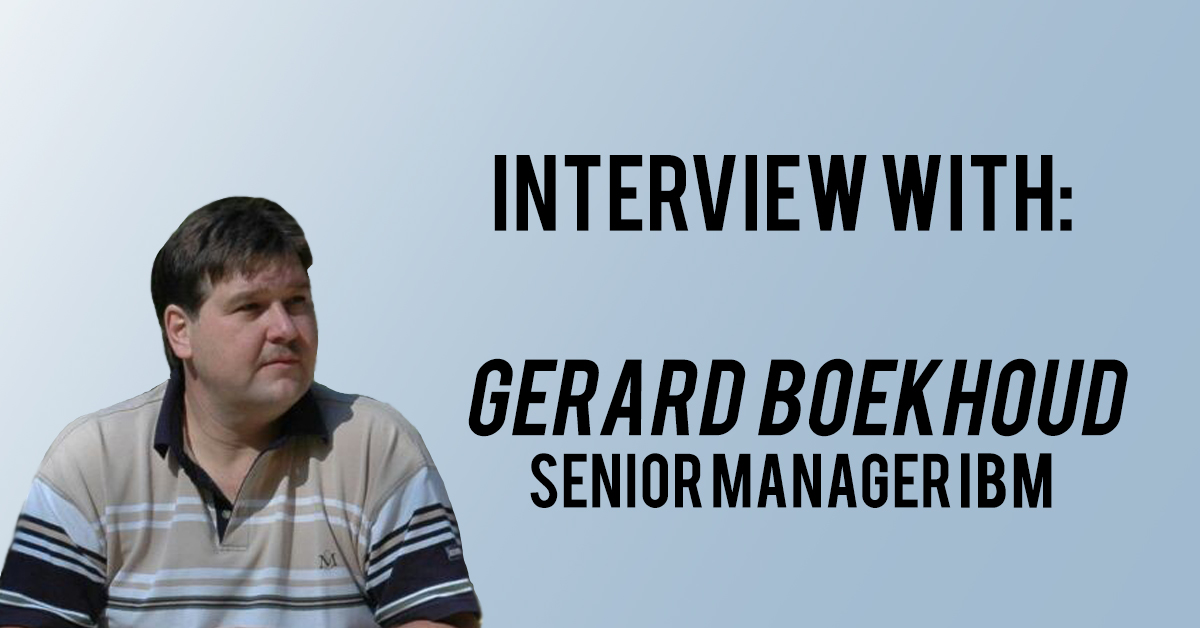My name is Gerard Boekhoud. I graduated with Electro Technique as main subject in Rotterdam. Subsequently I ended up in the ICT and started my career at IBM, where I currently work for 27 years now. I started as a technician, whereupon I became a manager and after that I fulfilled various different roles within IBM. At this moment I am Senior Manager Software Development.
As requested I will share my personal experience and ideas so I will not represent nor speak on behalf of IBM during this interview.
How does an ordinary week of work at IBM look like for you?
My main goal is to keep to organization up and running. As a manager, I am mostly concerned with running my department properly. Furthermore, it is very important to meet my targets. In addition, I translate the ‘language’ of technicians to the ‘language’ of up line management and vice versa. This is crucial to provide everyone with the same information and to keep everything transparent.
Could you tell something about specific tasks you as a Senior Manager Software Development at IBM have to perform?
In short, giving guidance to our team accurately, but also trusting them to do their job properly. Translating our technological activities for the benefit of our management line and representing our development lab both internally as externally are also important aspects of my work. Furthermore, as management, we are also responsible for the content of our new software and its release planning. In addition, it is important to be aware of everyone’s activities, progress, possible problems and where my help may further be needed. We deliver at least one release of our software every year. We not only design and build software but we are also responsible for maintaining our existing software and solving bugs of course. Because of the constantly evolving technology this requires a lot of development. It is a challenging task for our team to keep up with the amount of work we have to deal with and unfortunately finding suitable technicians becomes increasingly challenging these days. There is always more work to be done for a development department than you will able to realize in a certain period of time. We want to provide as much support as possible by adding new technology and features. Furthermore, we have to take into account that we also have to support external projects as efficiently as possible, and in such cases time is not always on our side.
“Years ago, your job and career were almost more important than your family. Looking back, I think that I should have spent more time with my family.”
Considering these three perspectives we are occupied building the best possible product within the given time frame. This is an incredibly complicated process that need good planning, design and management. In addition to these daily activities, I keep myself busy with the personal developments of the team within our department, but I also keep a watchful eye on a healthy work / life balance. It often happens that I send people home when I think they are working for far too long, as it is important to take a rest. Ignoring these kinds of observations leads to a less effective organization and people collapsing under their workload. If that would happen, the problems will much bigger, not only for them personally but also for the development team they are part of.
Are there technological changes that are taking place at this moment, and can the university respond to this?
Let me make a bold statement: all ICT knowledge that you now acquire will be completely obsolete in given and take 3 years from now. If you are young, adapting to the changes is relatively easy, but for older people it is a challenging task to keep up with all that new technology. At a certain point you will be overtaken by technology and everything you know will no longer be valid. Many students might not be aware of this. If you think that when once you are graduated the tough learning process will over, I have bad news, it is where it actually starts. Sure, Universities can certainly anticipate in this by linking the already known technology to the anticipated technology changes that the future may bring. In my opinion, technical universities are already doing this very well. Other universities are often too theoretical in terms of technology and sometimes have a lack of the practical aspect of technology.
Management, within technology is a real occupation. You can learn a lot of different topics during you education, applying them in the real world is something quite different. Management also depends on your empathic ability and if you do not possess these skills, I would not likely consider you for a management position. Studying a master in management does not ensure that you will be a good manager, it just gives you the tools so you could maybe become one.
How do you balance your work and personal life?
At the beginning of my career I hardly saw my children, but later when I got older I realized that I had to make some minor adjustments in my work/life balance. At the start of my career this was usually out of balance. I had the privilege that my wife stayed at home and wanted to take care of our children and because of this, it enabled me to work a lot. Otherwise I think this would not have been possible. In retrospect, I sincerely wonder if this has all been worth it and to be honest, I sometimes do have my doubts.
Looking back, I have often have been away from home, traveling, which is not so good for your body, your relationship and so on, but I eventually learned from it. I tried to adjust it, although I have to admit I actually never managed to work the regular 40 hours per week. I think it is important that besides your work you have many other things in life that you enjoy, like a lot of hobbies and social activities. This way you never get bored being only busy with work. I personally find this very important for maintaining a healthy work-life balance.
“Whatever you may choose, make sure that your work is your passion. If you will not get the needed energy out of your work you will not endure it over the years.”
The new (younger) generation is a bit better at finding that good work-life balance. When I started working it used to be that you married the company, but that is no longer the case. The so called lifetime employment no longer exists. Our job and career were almost more important than your family. I think that I should have spent more time with my family, looking back. It was like I blinked with my eyes and suddenly my children were 6 years and 9 years old already, I barely noticed anything of their childhood. I am afraid that some relationships have fallen apart because their work/life balance became very unhealthy. Something to keep in mind.
What is the most important thing you have learned in the various functions you have held during your career?
I think I already partly explained this in the previous questions but being a manager is a special kind of profession, and not a career path you should switch to lightly. I also have underestimated this at first completely. Putting it a bit black and white: in my opinion good technicians are quite often bad managers and good managers are by definition not the best technicians. The reason for this is that both professions are very distinctive professions which require a different type of passion, but again that is my personal view.
What kind of advice would you like to give to students?
No matter what type of management positions you are looking for, you do have to ask yourself whether this is really the profession you want. The line of work as a manger is very different from being a subject matter expert and slowly but surely you will drift away from the profession you studied for during you education at the University. Certainly within larger companies you also will have to deal with the political aspects of the business that becomes part of your work.
So my advice would be: Think carefully before you start your career. But whatever you may choose, make sure that your work is your passion. If you will not get the needed energy out of your work you will not endure it over the years. This will not only have consequences for your work but for you private life as well.
Going after a job just for the money, or the status, I find this the most stupid thing you can do if that work is not really your passion. If it sounds too good to be true… think twice. Students may not have this experience yet, but sincerely carefully consider the work you want to do after your graduation. After all, once you have made your choice and you are enter a certain role or position, it is most often very difficult to get out and switch to something completely different.
Furthermore, I sincerely hope that students will work towards creating a sustainable economy, think about the environment and think about the, social components of work and life. Always take care that your team comes first and what you decide is in good balance with personal career and goals. Having a strong team will enable you to achieve more and you will get rewarded by doing so.

















